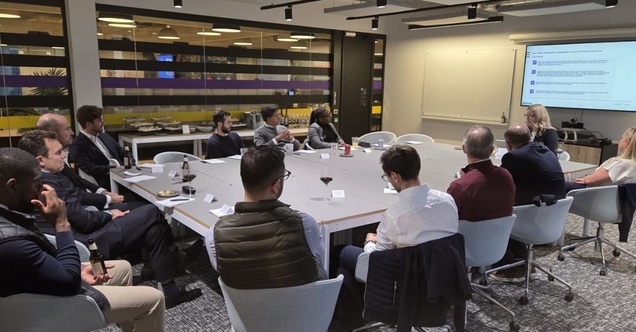AI in Audit: Shaping the future of audit in financial services

Eames Consulting and ECMS hosted a roundtable discussion on how AI is reshaping the audit industry on Thursday, 16th October. Hazel Rowe, partner at Eames Consulting, and Estelle James, managing partner at ECMS, were joined in our London office by 15 senior audit professionals from leading financial institutions to discuss the impact of AI on audit functions and share useful insights.
From ideas to implementation
With very few use cases currently live, there was a consensus that moving from ideas to implementation is one of the biggest challenges facing audit functions when it comes to AI. Some financial services organisations are firmly committed to moving ahead with AI, or are even fairly well advanced in their adoption of AI platforms, but their audit teams still need to grow or put the right processes and capabilities in place before they can join the party. When a business is still relatively immature from an AI perspective, proactive leadership is crucial in changing that mindset.
Integrating AI into audit methodologies
AI helps to free up time for people to think about what the data means. But first of all, that data needs to be right. As one attendee put it, “ChatGPT pointed at an empty filing cabinet is useless.” We need to link together our data points across the organisation so that AI can extract useful insights from them. Funds are shifting their people’s behaviours, encouraging them to see themselves as a data source linking different parts of the organisation together.
People skills and culture change
Softer skills are important for gaining buy-in from boards and non-execs. It’s about demonstrating that when you have the data right, the time freed up through AI can allow you to conduct more audits more quickly, and identify the trends.
The people element is the biggest challenge for many audit functions, particularly when auditors are used to doing things in a certain way. How do you drive a change-ready mindset across the organisation? “We’ve seen a rise in demand for data cultural analysts,” said Estelle, “who can change behaviours within the business and create a data-driven culture, helping the business make data-based decisions.” Other organisations have brought in an AI coach to help set standards, methodology and behaviours.
Combining the right tech with the right talent
Some of our attendees have hosted hackathon-style events to generate ideas and achieve cultural buy-in. This could involve asking groups to create an AI tool of their choice, and then developing the winner. One successful hackathon involved partnering with Microsoft to build a risk and control matrix using Copilot and Copilot Studio.
Ultimately, it depends where you are as a function. You can either buy a tool for those quick wins or, if you don’t have the knowledge, spend the same money on a keen tech graduate who can come in and innovate.
Why would an AI-savvy professional work in an audit function? Well for one thing, audit has the USP of being able to pioneer the building of RAG models with generative AI without having to go through long governance processes. In addition, new talent can have the privileged position of looking at the whole of risk from internal audit – something they wouldn’t get elsewhere.
The human touch is particularly important when attracting the right people, said Hazel: “When businesses are hiring AI talent at the moment, interview processes are taking too long and they’re sifting through candidates on LinkedIn with AI-generated CVs, while really good people are being stacked up. It’s often not what you know, but who you know – hoping TA understands enough about audit to know you’re good enough.”
The question of bias
The humans who created AI platforms are just as susceptible as everyone else to being biased or following the path of least resistance. That means we need to check our outcomes by testing AI’s performance over time to spot bias. A lot of key controls we’ve used for many years are still valid. In addition, more large language models are now showing how AI got to the output. One organisation has brought in an innovation champion to coach individuals on coding, ensuring prompts are phrased correctly.
Ultimately, we need to look at the output and understand the rationale behind it. The real value of generative AI is in redesigning what we’re doing – incrementally bringing about improvements with each iteration. As auditors, are we asking the right questions to help it do that?
Conclusion: it’s happening, with or without audit
If audit functions don’t accelerate their adoption of AI, other functions will. The question is: how quickly can we change our culture to allow us to keep up? Moving away from the traditional cautious auditor mindset will allow us to educate the business on the value of AI in audit and implement the right tools quickly.
These events are so important in helping us stay informed on an area that never stops moving, and many thanks to our attendees for sharing their insights.
We’ll be sharing plenty more on this event in the near future. In the meantime, if you’d like to discuss the impact of AI on your audit function, please contact Hazel.
Fresh Content
Explore our latest market insights, career advice, and more.













